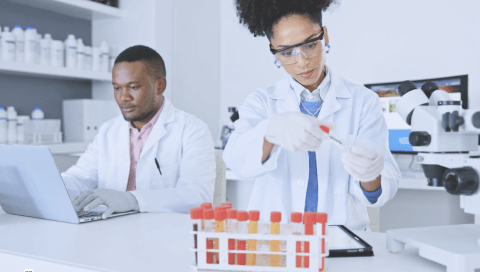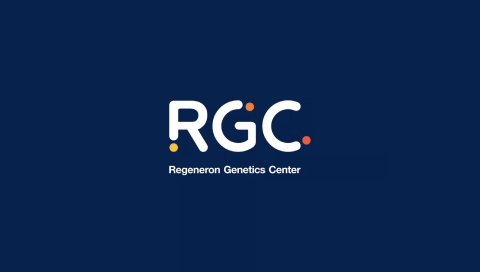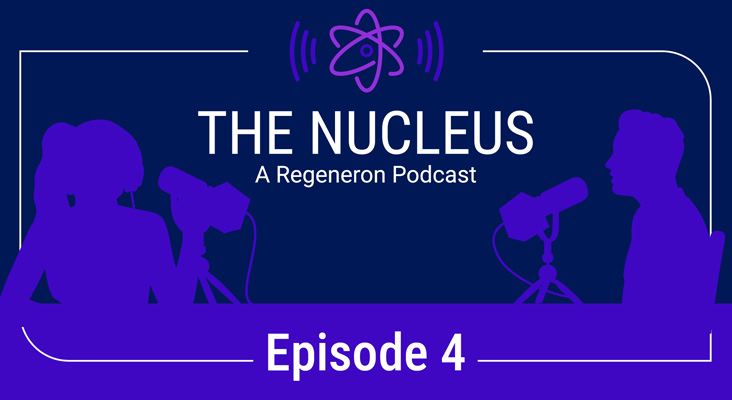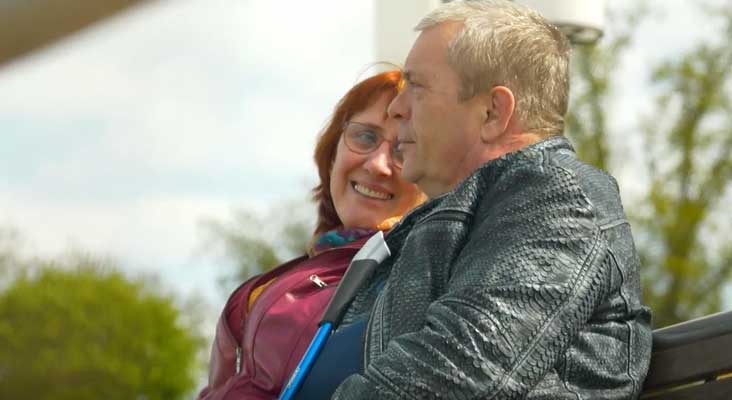Genetics
Advancing African Ancestry Representation in Genomic Research and STEM Education
October 18, 2023
Driven to make a difference through the Together for CHANGE Initiative
By: Lyndon Mitnaul, PhD, Executive Director, Research Initiatives, Regeneron Genetics Center®

Growing up, my mother taught me that no matter what bind you are in, you can always find a solution. You just need to be bold and think big. This is one of the reasons why I became a scientist — to help solve big problems affecting human health that don’t have easy solutions.
I carried this mantra with me to college and beyond. I attended Benedict College, a historically Black college and university (HBCU) in Columbia, South Carolina, where I majored in chemistry. Every year at Benedict I would see a Black scientist walking the halls, wearing a crisp suit, and talking with the science majors. I eventually learned that he worked at a biotechnology company and was offering an internship for select students studying science, technology, engineering and mathematics (STEM). One day I mustered up the courage to speak with him, and I am so grateful I did. High-quality mentorships can change your life — especially for people of color, who are underrepresented in the field. That internship, and this mentor specifically, offered a jump start to my career and continued to motivate me as I navigated my academic and professional journey.

Announcing Together for CHANGE
In 2020, the COVID-19 pandemic and rapidly growing social justice movement began to illuminate the health disparities affecting African Americans. Regeneron has always been a changemaker that strives to “think big” to have a positive impact on our future, just in the same way my mentor did years earlier. Together with Regeneron’s support and passion to think big, we hatched this “be bold” idea: Together for CHANGE™ (Changing Healthcare for People of African Ancestry Through InterNational Genomics & Equity).
Together for CHANGE is a historic public-private initiative established by our academic partner, the historically Black medical school Meharry Medical College, and biopharma — including AstraZeneca and NovoNordisk — to address health disparities and promote health in Black communities. It works in two fundamental ways: 1) as a research, training and STEM education grant program for people of African ancestry, and 2) as a study to increase representation in genetic research.
1. Empowering Educational Change
The first goal is aimed at improving the STEM educational pipeline for Black students. Even though similar proportions of Black and white students may intend to pursue STEM degrees, far fewer Black students succeed in achieving them.1 Together for CHANGE strives to improve this through training, internships and scholarships, and by connecting students to inspirational leaders in STEM from all sectors of scientific research — especially those who look like them. As part of this effort, Diaspora for Human Genomics Institute and Meharry Medical College will establish the first DNA Learning Center in Middle Tennessee, where students will learn about genetics research and perform live experiments onsite. Furthermore, we will build the first joint genetic counseling training program at Meharry Medical College, which will be the first training program of its kind at any of the 107 HBCUs across the country.
2. Expanding Representation in Genomic Research
The second goal is focused on addressing the underrepresentation of African ancestry data in genetic studies. Today, only 2% of the overall genetic information being studied comes from people of African ancestry, even though Africa is one of the most genealogically diverse locations in the world.2, 3 This has created a major gap in understanding the genetic drivers of health in this population, which can ultimately impact health care and health equity. To combat this, Regeneron, along with our partners, will create one of the largest African ancestry genetics databases in the world. Through our collaborators, we aim to recruit 500,000 volunteer participants of African ancestry, and their genetic codes will be sequenced by our very own Regeneron Genetics Center® (RGC). By focusing on genomic sequencing of people with African ancestry on a large scale, we will begin to have a better understanding of disease traits that specifically impact this population, but also in turn, how to better identify and treat diseases in the broader population.
The Impact: Driving Systemic Change
At Regeneron, we understand that as a global leader in science, we have a responsibility to help make the world healthier. The Together for CHANGE initiative is designed to address this directly and have an immediate impact on the Black community. What’s more, it will also have a lasting impact on long-term health outcomes for people of African ancestry by closing the gap in historical inequities seen in health education and treatment development.
Historically, many Black Americans have had a distrust of the healthcare system — and for good reason. Over the years, there has been a long legacy of discrimination and exploitation by healthcare providers and researchers that has had a lasting impact on this community. The time to come together and address these systemic issues is now.
To fundamentally change and truly address the current approaches and glaring disparities in health and healthcare that exist today, it is imperative that we partner with like-minded companies to drive systemic change and build a better future for Black Americans and people of African ancestry, with Black leaders and scientists at the helm. Increased representation of people of African ancestry in the healthcare ecosystem will strengthen our science and enhance potential treatment approaches for this population, as well as improve global understanding of all human health.
Together, we are going to create change for the Black community, and I am proud to be a part of the driving force that will lead to better health outcomes for this population. I look forward to providing mentorship to the next generation of scientists. May all of us think big and be bold.
References
- Riegle-Crumb C, King B, Irizarry Y. Does STEM stand out? Examining racial/ethnic gaps in persistence across postsecondary fields. Educ Res. 2019;48(3): 133-144.
- Sirugo G, Williams SM, Tishkoff SA. The missing diversity in human genetic studies. Cell. 2019;177(1):26-31. [Published correction appears in Cell. 2019;177(4):1080.]
- Gomez F, Hirbo J, Tishkoff SA. Genetic variation and adaptation in Africa: implications for human evolution and disease. Cold Spring Harb Perspect Biol. 2014;6(7):a008524.
More Regeneron Stories


